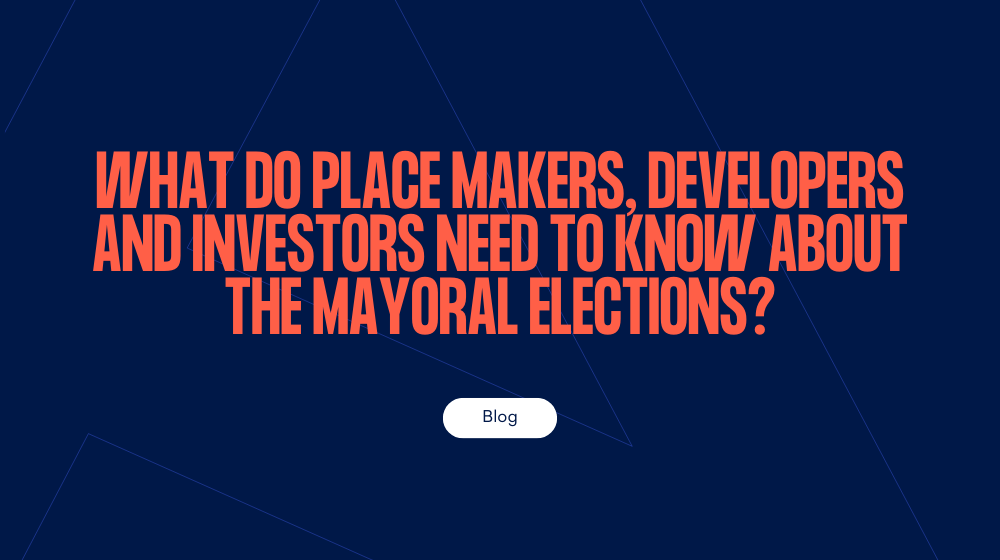Being a mayor in the UK can mean one of many things, and for those of us looking at who does what and why from the outside, it can be difficult to get your head around.
Take Liverpool – a city you would never accuse of being quiet politically. You have:
- A Lord Mayor – a ceremonial role
- An elected City Mayor – the leader of the local authority
- And a Metro Mayor – the leader of the city region, which brings together the six local authorities of Liverpool, Wirral, Sefton, St Helens, Halton and Knowsley.
It’s the same set up in other areas where there is a directly elected metro mayor too – you have a ceremonial mayor in each council area, as well as a local authority leader and chief executives of each council.
The most important role for property developers and investors to be aware of this May though is the metro mayor, because of the power and influence they have and, as this is still an evolving role, the opportunity to be part of the development plans in a region.
There will be nine metro mayors following this year’s elections, for Greater Manchester, Liverpool City Region, the West Midlands, Tees Valley, Bristol & the West of England, Cambridgeshire & Peterborough, Sheffield City Region, the North of Tyne Region and West Yorkshire.
All these areas have agreed devolution deals with central government, in which additional powers and budgets have been transferred to the authorities from Whitehall. New to the list, and being elected for the first time this May, is West Yorkshire, where elections are taking place in eight out of 10 local authorities, all but the Sheffield City Region and North of Tyne Region.
Our top tip is that it’s crucial for developers and investors to be aware of the new dynamic in planning, property and investment.
The relationship between local authorities, local economic partnerships, Chambers of Commerce, MPs and directly elected Mayors and their combined authorities is still evolving. There is always going to be a debate about who holds what power between politicians, and when you add more politicians into the mix, that becomes particularly acute.
Being aware of the dynamic where you are, or where you want to be, is crucial. Because, while the metro mayor’s job is to focus on wider issues that span beyond individual local authority boundaries, it would be naïve to think the views of this high-profile elected individual will not influence what happens in other areas outside of their direct control.
Devolution deals tend to state that the combined authority is responsible for developing a spatial framework in order to manage housing plans and development across the area, which must be unanimously agreed upon by all local authority leaders in the combined authority. The local authorities in that area then maintain the same powers over development as before – certainly at a granular detail level - but the metro mayor is consulted on planning applications that are of strategic importance to the whole city region.
There are other issues it is important to be aware of approaching 6 May – here are our four top tips:
1: Don’t ignore the elections
They matter. The Institute for Government’s analysis shows that four in ten of us will be living in an area with a directly elected metro mayor after May 2021 and nearly 45% of the country’s economic output (GVA) comes from these areas. The person elected will have a huge influence on the region they represent – both literally, with the devolved powers and budgets they are given, and figuratively, with their voice being able to shout about issues in the area they serve.
2: Understand what the mayors can (and cannot) do
All combined authorities lead on planning and strategy for economic development, regional transport and skills training. But the exact breakdown of what is devolved, and how, is different in each area. Key for any property developer or investor is the role mayors have in economic development and all but one of them (Cambridgeshire & Peterborough) can establish a body to invest in land and infrastructure themselves. Their policies and approach can have a significant impact on the value of land, what can be done with it, and who can do it.
3: Don’t assume
It will be in development and economic growth where we are likely to see some of the fiercest debates in the coming years between our towns, cities and regions. As with any engagement with decision makers in public affairs, it is important never to assume someone will have a particular response to plans or pitches. It will also be vital to establish who you should be talking to, and what they need to hear. Listening to all parties is going to be hugely important for any successful engagement strategy.
4: Be ready to engage post-election
It is never too early to start planning for engagement with the metro mayors. Whether it‘s in a location that will have someone doing the job for the first time, such as West Yorkshire, or somewhere that is already used to having that strong individual figurehead, such as Greater Manchester or the West Midlands.
If a particular location that you are focused on, or would like to be involved in, is an area covered by a combined authority and a metro mayor, they are a key figure that you should engage with personally, as well as with their wider team. But, of course, they are just one of the many layers you need to break through and influence - and knowing who to approach, how, when and why is even more important when there are different views, competing interests and complex decision-making processes.
Go with caution, it’s a bit of a minefield out there!




